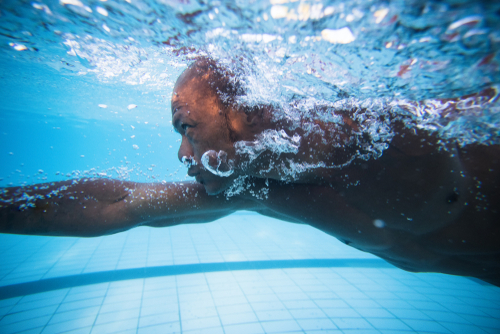
Learn How to Prevent Swimming Injuries with EmergeOrtho—Triangle Region
With summer right around the corner, there is one favorite pastime on everyone’s mind: swimming.
Whether you swim competitively or recreationally, this sport can involve a great degree of stamina, strength, and speed. Like any other sport, swimming’s physical demands can ultimately lead to a number of swimming injuries.
Can swimming cause a rotator cuff injury? Does swimming strengthen bones? How do you prevent swimming injuries?
The Sports Medicine Specialists at EmergeOrtho—Triangle Region have all the answers to your pressing questions just in time for swim season. Our board-certified, fellowship-trained team have worked extensively with a number of professional and recreational swim teams, allowing them to gain an expert-level understanding of the injuries, treatments, and prevention techniques surrounding swimming.
Can Swimming Cause a Rotator Cuff Injury?
Yes. Swimming (especially in professional athletes) requires a repetitive overhead motion performed at high speeds. This causes a large amount of strain to the neck, arms, and shoulders, which are the most common sources of pain and injuries in swimmers.
Swimmer’s shoulder is a term that refers to one or more common injuries caused by the repetitive overhead motions used in swimming. Common shoulder injuries include:
- Rotator Cuff Impingement
When you raise your arm overhead, the space between the top of your shoulder (acromion) and rotator cuff narrows. The acromion can rub against (or “impinge” on) the tendon and the bursa, causing irritation and pain.
- Bicep Tendinitis
Painful inflammation in the bicep tendon.
- Shoulder Instability
When the lining of the shoulder joint, ligaments, and/or tendons become stretched, torn, or detached, allowing the ball of the shoulder joint to move partially or completely out of the socket.
Aside from shoulder injuries, other common swimming injuries include:
- Breaststroker’s Knee
This non-specific term refers to one or more common injuries involving the medial (inner) portion of the knee, often caused by the breaststroke.
- Spondylosis
The dolphin kick (a common swimming style) may increase the risk for developing this spinal form of osteoarthritis.
- Spinal Cord Injuries
More than 1,900 spinal cord injuries every year are due to diving accidents, with some of these injuries leading to paralysis.
Does Swimming Strengthen Bones?
The answer is complicated. Although weight-bearing exercises are known to increase bone density swimming is not considered a weight-bearing exercise due to hypogravity. Swimming does have, however, many indirect benefits to the bones.
 Swimming is generally considered a low-impact form of exercise due to the density of water mitigating the effects of gravity. While this does not increase bone density, there is virtually zero impact on the joints, making it a great form of exercise for those experiencing arthritis, which is inflammation in one or more joints of the body.
Swimming is generally considered a low-impact form of exercise due to the density of water mitigating the effects of gravity. While this does not increase bone density, there is virtually zero impact on the joints, making it a great form of exercise for those experiencing arthritis, which is inflammation in one or more joints of the body.
A common form of arthritis is osteoarthritis, which is the wear and tear of the bone tissue in the joint. Swimming can help those suffering from osteoarthritis protect their bones.
Although swimming may not directly increase bone density, it does increase muscle mass, which leads to bone formation. One study even found that swimmers present a higher bone turnover value, which may result in a stronger structure and stronger bone.
How Do You Prevent Swimming Injuries?
Luckily, many common injuries can easily be prevented by following simple safety procedures and techniques:
DO NOT SWIM
- Alone if you are inexperienced
- If you do not feel well
- In rough or dangerous open waters
- In inclimate weather
- If you have consumed alcohol
- Before you have stretched and warmed up your muscles
- If you do not know proper swimming techniques
DOT NOT DIVE
- In shallow water
- In murky water where you cannot see the deepest point
Just Keep Swimming with EmergeOrtho—Triangle Region
With the right techniques and prevention measures, swimming injuries are easily avoidable.
If a swimming injury is sustained, you can trust the EmergeOrtho—Triangle Region specialists to get you back in the water in no time. Waterproof casts are available at some locations, allowing you to get back to swimming even faster!
To learn more, self-schedule an appointment now. Or, call us any time at (919) 220-5255.







